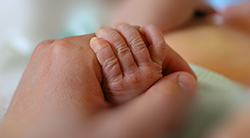
The research abounds: birth order has an impact on development. The Internet teems with articles on expected personality traits for firstborn and later-born children and, in a rare moment of consensus, experts agree that birth order matters.1 It influences a child’s need for attention, interest in interacting with adults versus peers, reactions to challenge and pressure, and relationship with parents. As the mother of two young sons (and a firstborn myself), I see evidence of this research daily and often wonder how birth order will affect my children’s lives.
Birth order matters in Parashat Bo, too. Bo begins with the final four plagues, culminating in that infamous, horrifying last plague: makat b’chorot, the killing of the firstborn. God takes this concept to its extreme, condemning every single firstborn — whether human or animal — to perish. The Israelite firstborns were saved by placing lambs’ blood on their doors.
But the emphasis on the firstborn doesn’t end with the 10th plague. After the conclusion of the plagues, God commands Moses, “Consecrate to Me every first-born; human and beast, the first [male] issue of every womb among the Israelites is Mine” (Exodus 13:2). This statement lays the groundwork for a ritual called pidyon haben, in which parents must symbolically redeem their firstborn son from God’s ownership via an offering of coins on the 31st day after birth.
While the Torah offers many examples of God’s relationship with firstborn humans, animals, and even plants, in this commandment, God essentially places a claim on all Israelite firstborns, forever. While God does not require a sacrifice through death, this is still an exchange nonetheless. Is God really placing some kind of quid pro quo on the Israelites for saving their firstborns from the 10th plague?
God’s covenant with the Israelites eschews human sacrifice, but by connecting the firstborn to God in a nonsacrificial way, a new category of religious expression is created. Now, the Israelites have a symbolic way of showing devotion to God and also of confirming that there is no joy taken from the plagues. The plagues culminate in Israel’s redemption, and as a result, the Israelites redeem their firstborns as an eternal show of gratitude to God.
Liberal Jews have sometimes struggled with pidyon haben and with the concept of indebtedness to God. The idea of needing to redeem a new baby from God can seem like an ancient ritual, divorced from contemporary ideas of parenthood and newborn life. Additionally, Reform Judaism’s emphasis on individual choice reflects that it’s challenging to feel indebted to God: shouldn’t we be worshipping God and performing rituals because we choose to, not because we’re shouldering a never-ending payment on a millennia-old debt?
With all of this weight placed on the firstborn’s shoulders, it also raises the question: What is the relationship to God of the other children who do not have to be bought back? Do they matter? I think about my own family: I love my sons differently but equally, something I couldn’t conceive of before our younger child was born. The idea that one is more intrinsically holy or connected to God feels somehow like a betrayal of them.
So how, in the modern world, do we reinterpret the idea of firstborn symbolically versus literally? As a society, we no longer view the world in terms of rank by birth order: an older child doesn’t receive any different dowry or inheritance than a younger sibling. Or to say it differently, birth order has been democratized.
Nevertheless, we still practice a form of Judaism that stems from God’s commandment to symbolically consecrate firstborns. Of course, we no longer sacrifice lives to worship God, but we have built our communal practices of worship and ritual around this concept of expressing our gratitude to God.
Earlier in Exodus, God tells Moses that “Israel is My first-born son” (Exodus 4:22). This is another way of understanding the covenantal relationship between God and Israel. God loves and protects Israel as a firstborn, and in return Israel will forever belong to God. God expands the emphasis on the firstborn as a way to emphasize the developing peoplehood of Israel.
Today, we can use the concept of Israel as God’s firstborn as a way to broaden the meaning of the firstborn’s ties to God. Essentially, we are all symbolic firstborns, consecrating ourselves to God by actively choosing Judaism and a Jewish life, not because we are in debt to God or because we have to due to birth order or lineage, but because Jewish tradition offers a way to understand the world, our history, and our place in it with depth, meaning, joy, and compassion.
It is ironic that the killing of the Egyptian firstborns in the 10th plague is a primary event that sets up the covenantal relationship between the Israelites and God. Yet, it’s also a reminder that our covenant came with a heavy price. We can choose that special firstborn relationship as a way to understand choosing Judaism, and yet we also must remember that our firstborn symbolic uniqueness is tempered with the memory of a legacy that includes that 10th plague.
1. Please see these sources:
E. Cole, Birth Order: An examination of its relationship with the Big Five personality theory and Trait Emotional Intelligence, doctoral thesis, UCL (University College London, 2014)
D.L. Paulhus, P.D. Trapnell, D. Chen, “Birth order effects on personality and achievement within families,” Psychological Science, 1999
Rabbi Ana Bonnheim recently moved to Charlotte, NC with her husband and two young children. She served as the associate director, and director of year-round programs, at URJ Greene Family Camp in Texas for the past 8 years.

This week’s Torah portion forces us to consider the following: Is being the oldest child, the firstborn, really a reward? Or is it an obligation?
Indeed, as Rabbi Bonnheim suggests, symbolically, we all have the opportunity to be the firstborn as the Torah teaches, “Israel is My first-born son” (Exodus 4:22). But wasn’t Esau the firstborn? What then is the meaning of the verse? Our ancient tradition offers the following response: “It refers to Jacob, their ancestor, who purchased the birthright in order that he might serve God” (Sh’mot Rabbah 5:7).
Being firstborn, then, is not at all about being born first. It’s about a different kind of status, one of commitment to service and committing what we have to divine service. It’s not only about service to God through worship, but also about service to our communities and to our world through our actions.
We learn about the firstborn’s commitment to God in the very painful passage of the death of all Egypt’s firstborn sons. This parallel cannot be ignored, and it calls us — through our traditional frame of the Exodus narrative — to be aware of injustice in our world, and to dedicate ourselves to repair. Since the time of our Exodus, to be a firstborn means to stand up, means to be a role model and a guide for moral compass. To be a firstborn is not merely a right, but an obligation.
“Israel is My first-born son” (Exodus 4:22). Being a firstborn is also not a choice. God has called each of us, all of us, the people of Israel, God’s children. Therefore, we have the responsibility and the obligation to live up to that status. To live up to dedicating our hearts and our actions to what God expects: “To do justly and love mercy, and walk humbly with God” (Micah 6:8).
Rabbi Amanda Greene is the assistant rabbi at Chicago Sinai Congregation in Chicago, IL.
Bo, Exodus 10:1-13:16
The Torah: A Modern Commentary, pp. 448-471; Revised Edition, pp. 405–426;
The Torah: A Women's Commentary, pp. 355–378
Haftarah, Jeremiah 46:13−28
The Torah: A Modern Commentary, pp. 700−702; Revised Edition, pp. 427−429
Explore Jewish Life and Get Inspired
Subscribe for Emails


